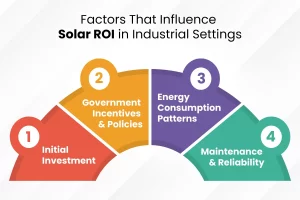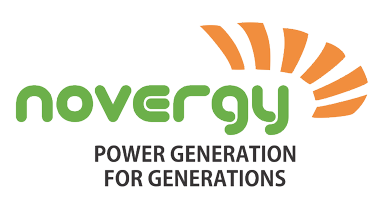Introduction
Installing solar panels in your business is an excellent way to reduce the size of your carbon footprint while saving some money.
Many Industrialists, after getting solar panels for their businesses, have the same question: “ How much ROI will I get on these Solar Panels?”
But before diving into the deep sea of ROI on Solar Panels, in this blog, we will discuss what is ROI in solar panels, how you can calculate it, and how you, as an industrial leader maximize your ROI.
Understanding Solar ROI for Industries
ROI on solar panels means measuring how the solar installation cost compares to the income it produces. Solar panels are always denoted as an initial investment, but are they really an investment?
By understanding how to calculate solar panel ROI, you will understand whether the initial cost of investment is balanced out by your energy savings or the money you earn by selling power back to the grid.
To get an average of how much solar systems can help you in paying your bills, it’s good to calculate the estimated solar ROI and payback period. Calculating these two helps you in understanding whether your devices offer the expected financial benefits.
Because solar panels are often installed with cost savings and income in mind, it’s a good idea to calculate a rough estimate of solar panel ROI before you begin installing.
How to Calculate ROI on Solar Panels
ROI of solar panels depends on the total lifetime of your solar panels, meaning it measures how much money your panels make or save you from the moment they’re installed until the moment they stop working. Since it’s hard to know exactly when solar panels will lose effectiveness, their warranty is counted as an estimate of their lifetime.
If you want to calculate your ROI on solar panels manually the there is a basic formula used to calculate it: (Total Lifetime Savings – Total Investment Cost) / Total Investment Cost x 100.
But why waste your time calculating manually when you can just put the data in Novergy’s Solar Calculator and get the ROI of your business!
Factors That Influence Solar ROI in Industrial Settings

1. Initial Investment:
Solar energy takes a huge capital investment at the start, which may not be feasible for everyone. Its design, its maintenance, and its equipment all come under this initial investment. However, it’s a one-time investment as you don’t have to pay monthly usage charges.
2. Government Incentives & Policies
Many governments provide incentives and subsidies for solar energy, primarily including direct subsidies, such as the PM Surya Ghar: Muft Bijli Yojana in India, which provides financial assistance for rooftop solar installations and free electricity up to a certain limit.
3. Energy Consumption Patterns
Unlike electricity, solar energy can be used 24/7 without any cost of usage; however, the owner gets subsidies and paychecks from the government, and its potential users.
4. Maintenance & Reliability
Industrial solar panels are designed for durability and require minimal operation and maintenance. With fewer moving parts and long-lasting performance, solar systems keep running efficiently for many years. This low upkeep not only reduces unexpected costs but also ensures consistent energy savings, directly improving the overall return on investment.
Average ROI & Payback Period for Industrial Leaders
On average, industries can expect ROI figures ranging between 18% and 30% annually, depending on the size of the installation, local tariffs, and available incentives. Since industries consume large volumes of electricity, the savings accumulate quickly, making solar power one of the most cost-effective energy solutions for businesses.
The time taken to recover the initial investment typically ranges from 3 to 6 years for industrial solar projects. Once the system has paid for itself, the business continues to enjoy almost free electricity for the remaining lifespan of the panels, which can stretch up to 25 years.
Real Business Benefits Beyond ROI
1. Reduced Operational Costs
When an industrialist transitions from fossil fuels to renewable energy, they reap numerous benefits, one of which is having almost zero operating costs. Operating cost refers to the expense of using electricity on a day-to-day basis, which becomes zero when you have your own solar project.
2. Sustainability & CSR Value
By switching to clean energy, industries significantly reduce their carbon footprint, cut greenhouse gas emissions, and contribute to global climate goals. This commitment to renewable energy strengthens a company’s environmental responsibility and positions it as a forward-thinking leader in its sector.
3. Energy Independence
Solar energy is free to use as much as you want without any dependence on fossil fuels, as it does not require any use of fossil fuels such as petroleum, diesel, or coal. This energy independence also denotes that you can use as much electricity as you want without wasting any resources.
How Industrial Leaders Can Maximize ROI
1. Choose High-Efficiency Solar Panels
Choosing high-efficiency solar panels delivers more power per square meter, which is beneficial for industries with large energy demands. By using the right solar panels, you can save more and generate more with a small amount of space and investment.
2. Partner with Trusted EPC/Solar Providers
Working with a reliable EPC partner like Novergy ensures the right system sizing, high-quality installation, and compliance with industry standards. Trusted provider such as Novergy also offers support till the end of the whole project, helping industries avoid costly errors and achieve faster returns.
3. Monitor and Maintain Systems Effectively
Even though solar panels do not require that much maintenance and operational cost, it is a great tip to regularly maintain them to prevent efficiency losses. Scheduled maintenance, remote performance tracking, and quick fault detection keep energy production consistent, protecting the ROI throughout the system’s lifespan.
Conclusion
For industrial leaders, the ROI on solar panels is more than just a financial calculation; it’s a long-term strategy for cost savings, sustainability, and energy independence. With average payback periods of 3–6 years and ROI figures reaching up to 30%, solar energy proves to be one of the smartest investments for industries aiming to reduce operational expenses and future-proof their businesses.
By choosing high-efficiency panels, partnering with reliable providers, and maintaining systems effectively, companies can maximize returns while contributing to global sustainability goals. Novergy Solar, with its proven expertise and advanced solar solutions, helps industries achieve faster paybacks, dependable performance, and lasting financial benefits.
Invest in solar with Novergy today—and secure a greener, more profitable, and future-ready tomorrow for your business.
FAQs
1. What is the 20% rule for solar panels?
Ans- The 20% rule means getting at least 20% more energy than your business usually needs. It is a way to avoid power loss during cloudy days or high-use months.
2. What is the profit margin on solar panels in India?
Ans- The profit margin of solar panels in India is around 10% to 30% in India, in a timespan of 3-6 years.
3. What is the lifespan of a solar panel?
Ans- Usually, the lifespan of a solar panel is 25 to 30 years.
4. Do solar panels need maintenance?
Ans- Yes, solar panels do need minimal maintenance, primarily involving periodic cleaning to remove dirt, which helps in preventing efficiency losses

